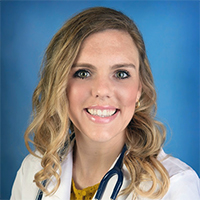
Please tell us a little about yourself and your journey as a DNP.
My name is Melanie Allard; I am a family nurse practitioner who works at UNCH in the division of Medical Oncology, specifically with cancers of the gastrointestinal tract. Through autonomy, I aid in managing this very specialized patient population. This population includes but is not limited to those undergoing treatment or surveillance for hepatobiliary, pancreatic, colorectal, esophageal, and gastric cancers.
I graduated from nursing school at UNCW in 2013. I was a nurse for two years before going back to graduate school at East Carolina University to obtain my DNP degree. I worked the entire time I was going back to school in various critical care settings, including step-down ICU (PCU), Cardiac ICU (CICU), and the Medicine ICU (MICU). After obtaining my DNP – FNP degree, I worked in a rural Gastroenterology practice.
I recently started at UNC last April. Shortly after returning to UNCH, I started a post-master certificate program through UNC – Chapel Hill to obtain my Adult-Gerontology Acute Care NP certification this coming May. This additional degree will allow me to diagnose and treat conditions associated with our complex patient population.
What led you to the specialty of Gastrointestinal Oncology?
I’ve always had a personal interest in oncology. However, there were no open positions at the time of graduation, so I subsequently took my first NP job in rural medicine, specifically in a Gastroenterology practice. That position was humbling and allowed me to grow as a new nurse practitioner. During my time at that practice, I helped aid diagnostic workup for those who were not yet diagnosed with cancer as well as treated many patients who were undergoing chemotherapy treatment. At that moment, I realized I wanted to be an integral part of treating and managing this patient population. However, it was also during that time that I realized I wanted to do more with my career. I wanted to be at an academic institution, learning, growing, and being at the forefront of oncology innovation with my colleagues. Luckily, in my favor, UNC medical oncology was expanding its GI group, so I applied, and here I am.
What has been interesting or exciting for you about your career?
I have an extensive background in critical care medicine which has opened my eyes to various situations, experiences, and friendships. These experiences and relationships, past and future, continue to shape me personally and professionally. Suppose there is one thing that I have learned throughout my healthcare career. In that case, this field is forever changing, allowing me to become more intuitive, compassionate, and knowledgeable constantly. I am excited about the future for advanced practice providers, as the bandwidth and scope of practice continues to evolve and lead to new innovative ways to provide better access to healthcare.
Are there any common misconceptions about Gastrointestinal Cancer? If yes, what are some?
One prominent misconception in GI cancers is that there is no cancer if there is no pain, which is not the case. Therefore, I advise everyone to routinely see a primary care provider for routine lab work and physical examinations and to ensure cancer screening is up to date, including a colonoscopy, which starts at the age of 45.
In what ways do you feel lecture series like the Community College Oncology Lectures are important for students at community colleges?
I think that these lectures aid in broadening students’ horizons to various clinical backgrounds, future career specialty options, and advance practice nurse’s roles as we continue to grow and emerge in every aspect of healthcare.
Thank you, Dr. Allard, for your time!
Please tune in to our Community College Oncology Series Lecture “Caring for Patients with GI Cancers” with Dr. Allard on March 21st from 4:00 PM-5:00 PM